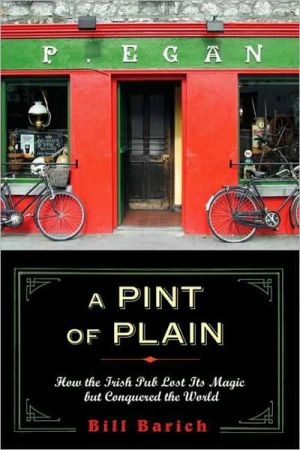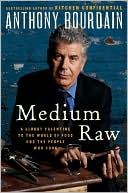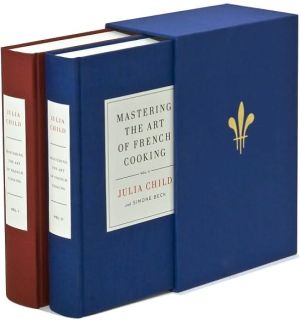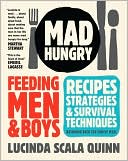Pint of Plain: How the Irish Pub Lost Its Magic but Conquered the World
Seamlessly blending history and reportage, Bill Barich offers a heartfelt homage to the traditional Irish pub, and to the central piece of Irish culture disappearing along with it.\ After meeting an I rishwoman in London and moving to Dublin, Bill Barich—a “blow-in,” or stranger, in Irish parlance—found himself looking for a traditional I rish pub to be his local. There are nearly twelve thousand pubs in Ireland, so he appeared to have plenty of choices. He wanted a pub like the one in John...
Search in google:
Seamlessly blending history and reportage, Bill Barich offers a heartfelt homage to the traditional Irish pub, and to the central piece of Irish culture disappearing along with it. After meeting an I rishwoman in London and moving to Dublin, Bill Barich—a “blow-in,” or stranger, in Irish parlance—found himself looking for a traditional I rish pub to be his local. There are nearly twelve thousand pubs in Ireland, so he appeared to have plenty of choices. He wanted a pub like the one in John Ford’s classic movie, The Quiet Man, offering talk and drink with no distractions, but such pubs are now scare as publicans increasingly rely on flat-screen televisions, rock music, even Texas Hold ’Em to attract a dwindling clientele. For Barich, this signaled that something deeper was at play—an erosion of the essence of Ireland, perhaps without the Irish even being aware. A Pint of Plain is Barich’s witty, deeply observant portrait of an Ireland vanishing before our eyes. Drawing on the wit and wisdom of Flann O’Brien (the title comes from one of his poems), James Joyce, Brendan Behan, and J. M. Synge, Barich explores how I rish culture has become a commodity for exports for such firms as the I rish Pub Company, which has built some five hundred “authentic” Irish pubs in forty-five countries, where “authenticity is in the eye of the beholder.” The tale of Arthur Guinness and the famous brewery he founded in the mid-eighteenth century reveals the astonishing fact that more stout is sold in Nigeria than in Ireland itself. While 85 percent of the I rish still stop by a pub at least once a month, strict drunk-driving laws have helped to kill business in rural areas. Even traditional I rish music, whose rich roots “connect the past to the present and close a circle,” is much less prominent in pub life. I ronically, while I rish pubs in the countryside are closing at the alarming rate of one per day, plastic I PC-type pubs are being born in foreign countries at the exact same rate. From the famed watering holes of Dublin to tiny village pubs, Barich introduces a colorful array of characters, and, ever pursuing craic, the ineffable Irish word for a good time, engages in an unvarnished yet affectionate discussion about what it means to be Irish today. The Barnes & Noble Review When Bill Barich lived in London 25 years ago, he went looking for a pub. Not just any pub, but the real article: a neutral ground of casual friendship, inclusive, restorative, democratic, and possessing a bonhomie emanating from devotion to the spoken word, the comfort of a "low babble of voices in discourse." He wrote up his quest in a sweet, lapidary piece for The New Yorker, "The Fountain." Barich gratifyingly expands upon the topic here; now living in Dublin, Ireland, he's questing again for a local pub, informed in part by the romantic ideal captured in John Ford's The Quiet Man. Ireland, however, is not immune to change, and many of its old pubs have become trophy establishments, cashing in on their literary and sentimental associations, or simply turned into bad caricatures -- you can buy a patented-notion-of-Irish-public-house kit direct from Guinness (500 in 45 countries, and counting). Barich visits the countryside, too, where pubs are dying at a rate of one a day, lost to the real estate market, police checks, and younger family unwilling to serve; this, God help us, in a land where a well-known saint turned a leper's bathwater into a bucket of ale. Barich will settle for nothing less than the elemental, elusive quality known as craic: that pleasing atmosphere created by a "collectively produced performance.conversation becomes intense, the noise level soars." A worn floor, a turf fire, a genial but hard-nosed publican -- captain of the ship, yet capable of squeezing "an ounce of mirth from a broken leg" -- and some live music would be nice, improvisatory magic "rich in unexpected twists and discoveries, with the players bouncing off one another." Happily, Barich -- his own euphonious voice as soothing as a peat fire and a pint of the black -- finds a worthy handful of pubs and draws them with such clarity and character that they erase the ordinary cares of even the most distant reader. --Peter Lewis
Ch. 1 A Pint of Plain 1Ch. 2 Jack Birchall's Ranelagh House 5Ch. 3 A Shock to the System 23Ch. 4 The Ancient Birthplace of Good Times 37Ch. 5 Mirth Is God's Medicine 61Ch. 6 The Gravediggers 83Ch. 7 The Halcyon Days of Manhood 105Ch. 8 The Cobblestone 127Ch. 9 The Folly of Cong 151Ch. 10 A Wise Man, Indeed 173Ch. 11 Closing Time 197Ch. 12 Journey's End 219Bibliography 239
\ From the Publisher“With scholarly rigor, he surveys the literature on the history of drinking, drunkenness and pubs before rewarding himself with the grueling and perilous fieldwork of sampling deeply from the 12,000 outposts in Ireland where alcohol is sold by the glass…Mr. Barich's picaresque meander through the Irish bloodstream is an entertaining survey of the culture and commerce of Ireland at a tremulous moment in its history…Fascinating.”\ —William Birdthistle, Wall Street Journal\ “Barich weaves a never-ending stream of oddly engaging historical and literary references into every dead end…Barich’s passion for boozy subjects is broad and undeniable. He’s equally at ease covering the effects of the temperance movement and introducing regional slang terms for being drunk.”\ James Oliver Cury, New York Times Book Review\ “The American writer Bill Barich moved to Ranelagh, on Dublin's south side, some time ago and set out to find the perfect Irish pub. A Pint of Plain: Tradition, Change, and the Fate of the Irish Pub is an engaging account of his quest and investigations.”\ —Katherine A. Powers, Boston Globe\ “Nicely researched, intelligently written, his book is a fun read tinged with melancholy at the thought of time passing and things changing; appropriately Irish, I think.”\ —Laurie Hertzel, Minneapolis Star Tribune\ \ \ \ \ \ James Oliver CuryBarich weaves a never-ending stream of oddly engaging historical and literary references into every dead end…Barich's passion for boozy subjects is broad and undeniable. He's equally at ease covering the effects of the temperance movement and introducing regional slang terms for being drunk.\ —The New York Times\ \ \ Publishers WeeklyAll that the author, a California transplant, wanted was to find the perfect pub in his Dublin neighborhood, an easy task since Barich had "been in training for the job most of my life." What should be a breeze morphs into a countrywide pub crawl and journalistic investigation, as the author discovers that the romanticized Irish pub of The Quiet Man has become commercialized, while stricter drunk driving laws and Ireland's changing social dynamics don't bode well for the future of the places beloved by everyone from Joyce to the working class. Barich (Laughing in the Hills) also talks about the various aspects of Irish pub culture, from its music to its literary denizens. Barich crams in a lot of intriguing elements-history, sociology, autobiography, travelogue, character study-without deciding on a focus. Consequently, his effort feels less like a book than a collection of loosely connected facts and observations, which gradually languish as the author strays from the revelatory and informative (e.g., the nutritional qualities of Guinness; Ireland's attempts at temperance) for the quaint. (Mar.)\ Copyright © Reed Business Information, a division of Reed Elsevier Inc. All rights reserved.\ \ \ \ \ Library JournalBarich (A Fine Place To Daydream: Racehorses, Romance, and the Irish) is a "blow-in" to the Irish pub scene, an American who married an Irishwoman and went in search of a pub to call his own. What he found was a bit of a disappointment to someone raised on the stories of James Joyce and Brendan Behan, which extol the virtues of the dingy, dark, yet cheery pubs of yore. Today "McPubs," as they've been disparagingly nicknamed, are brightly lit, cater to families, and scatter around ersatz Irish traditions. Barich tracks their export to countries around the world-you can sample bread and drippings and sip an Irish Car Bomb in such places as Beirut, Ho Chi Minh City, and Guam. Barich did find a favorite pub, and, even in an age of early closings and cigarette smoking bans, he manages to explain the lure and lore of an Irish pub with wit and insight. There are several books on the market concerning Irish pubs, many of which contain color photos (Barich's features black-and-white illustrations), so large public libraries might want to consider this a prime optional purchase.\ —Joseph L. Carlson\ \ \ \ \ \ The Barnes & Noble ReviewWhen Bill Barich lived in London 25 years ago, he went looking for a pub. Not just any pub, but the real article: a neutral ground of casual friendship, inclusive, restorative, democratic, and possessing a bonhomie emanating from devotion to the spoken word, the comfort of a "low babble of voices in discourse." He wrote up his quest in a sweet, lapidary piece for The New Yorker, "The Fountain." Barich gratifyingly expands upon the topic here; now living in Dublin, Ireland, he's questing again for a local pub, informed in part by the romantic ideal captured in John Ford's The Quiet Man. Ireland, however, is not immune to change, and many of its old pubs have become trophy establishments, cashing in on their literary and sentimental associations, or simply turned into bad caricatures -- you can buy a patented-notion-of-Irish-public-house kit direct from Guinness (500 in 45 countries, and counting). Barich visits the countryside, too, where pubs are dying at a rate of one a day, lost to the real estate market, police checks, and younger family unwilling to serve; this, God help us, in a land where a well-known saint turned a leper's bathwater into a bucket of ale. Barich will settle for nothing less than the elemental, elusive quality known as craic: that pleasing atmosphere created by a "collectively produced performance...conversation becomes intense, the noise level soars." A worn floor, a turf fire, a genial but hard-nosed publican -- captain of the ship, yet capable of squeezing "an ounce of mirth from a broken leg" -- and some live music would be nice, improvisatory magic "rich in unexpected twists and discoveries, with the players bouncing off one another." Happily, Barich -- his own euphonious voice as soothing as a peat fire and a pint of the black -- finds a worthy handful of pubs and draws them with such clarity and character that they erase the ordinary cares of even the most distant reader. --Peter Lewis\ \








